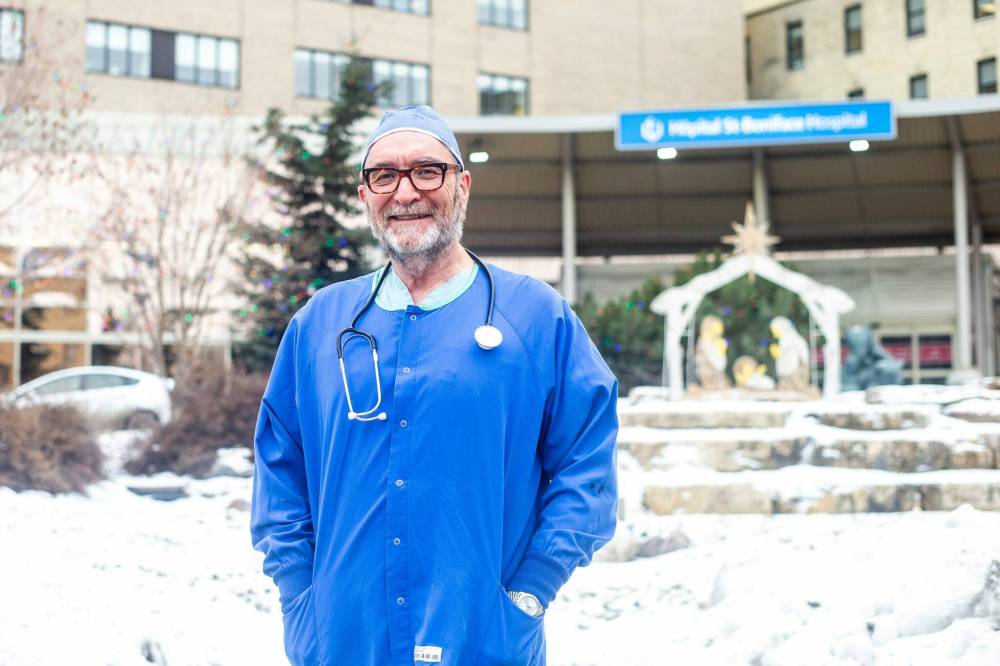
A well-known Winnipeg intensive-care unit doctor has been hand-picked by the Kinew government to provide advice from the front lines and lead a new provincial health-care advisory table.
Dr. Eric Jacobsohn was appointed special adviser to Health Minister Uzoma Asagwara Tuesday and will officially start the new post with the NDP government in mid-January.
“I think this health-care system can be excellent,” said Jacobsohn, a cardiac anesthesiologist with more than 30 years experience in Manitoba’s hospitals. “I think with a new outlook and an enthusiasm and, frankly, an expectation from our public for us to be good, I think we can be that.”

Jacobsohn said his job is to provide a “direct line of communication” between health-care workers, Asagwara and Premier Wab Kinew, and to be a sounding board for the government as it pursues its health-care agenda.
His time will be split between the advisory role and his positions at St. Boniface Hospital and the Health Sciences Centre, where he’ll continue to work in a clinical capacity. He will, however, be taking a leave from his job as associate dean at the University of Manitoba’s Max Rady College of Medicine.
“A crucial nature of this position is an experienced, engaged, front-line clinician, and not another health-care leader/bureaucrat,” Jacobsohn said.
The doctor will also keep an office at the Manitoba Legislative Building and chair a new provincial health-care advisory table, the members of which have yet to be announced.
“This is an opportunity where you have a health-care worker who understands what’s happening on the front lines, that people can have access to, bring ideas to, which can then be escalated to the advisory council,” explained Jacobsohn.
The appointment is a sign the NDP government is genuinely willing to hear from health-care workers, he said.
“This is about as close you can ever make government to the front line,” he said.
During the fall election campaign, Jacobsohn endorsed Kinew and the New Democrats and lamented the “dramatic deterioration” of the health-care system under the former Progressive Conservative government.
Jacobsohn was later brought on as a member of the NDP’s transition team following the party’s Oct. 3 majority government win.
He was also outspoken about the former government’s response to the COVID-19 pandemic and was part of a group of senior doctors who called for a total lockdown in May 2021, when Manitoba was forced to fly critically ill patients out of province for care.
With the right vision and attitude, Jacobsohn said he believes health care can be changed for the better.
“I’m at a position where I’m able to think about changing direction slightly to try and serve, and that’s what’s inspired me to do this… nothing more, nothing less. I think we can make a difference.”– Dr. Eric Jacobsohn
“I’ve always also believed that you can’t always find fault and not come up with solutions,” he said.
“I’m at a position where I’m able to think about changing direction slightly to try and serve, and that’s what’s inspired me to do this — nothing more, nothing less,” Jacobsohn said. “I think we can make a difference.”
Asagwara said it is important to listen to front-line expertise as the NDP government attempts to get health care into a better state.
The government wants to hire 1,000 new health-care workers, open three new emergency departments in Winnipeg, create five neighbourhood illness and injury clinics and establish new centres of excellence to make good on a a suite of health-related campaign commitments.
“Dr. Jacobsohn is somebody who, beyond having a tremendously positive reputation in the health-care system, he has critical-care expertise and leadership expertise and great relationships across the health-care system that will really benefit our government’s approach to health care,” Asagwara said.
The top priority is addressing the staffing crisis and resetting the culture of health care in Manitoba, Asagwara said, but the government will also be seeking Jacobsohn’s advice on emergency room wait times and improving critical-care capacity.
“One of the things that I value greatly is how forthcoming he, and others, have been with their ideas and with areas of the health-care system they believe have been neglected and need attention from our government,” Asagwara said.
The advisory table, meanwhile, is an opportunity to learn from experts across the system, the health minister said.
“It’s about collaboration, it’s about actioning our commitment to listening to and working with health-care expertise, and it’s another step that we intend to take to continue to move health care in the right direction,” Asagwara said.



